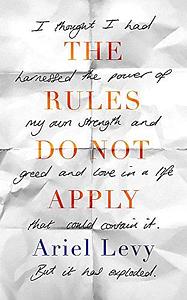Take a photo of a barcode or cover
3.5 stars. Beautiful writing and a compelling story of staggering loss. But I didn't learn much, my soul wasn't moved, etc. Definitely a lot of white girl privilege going on. An interesting, quick read nonetheless.
I really enjoyed this. The author provides a poignant view into some very difficult life experiences. Definitely made me cry at one point.
This memoir was readable, and it has its fine moments here and there, where the writing is eloquent, but ultimately I could not connect with the author or her story, which is odd, because she loses a child and a relationship. I should feel empathy, or at least have some emotional response, as I usually do when reading a memoir, but I didn't with this book. At times it seemed affectless, other times facile, sometimes melodramatic. I'm chalking it up to mediocre writing. (Levy is not my favorite New Yorker writer, and I recall thinking-- as I've read her articles in the past-- how on earth did she get hired at the New Yorker?) It's possible she tries to cover too much ground and thus remains on the surface of the story (parents, childhood, her career, relationships, friendships, articles she's written). The book might have been better with a tighter focus on just the relationship and the pregnancy/loss.
I enjoyed Ariel's writing style as a whole, so much so that I remembered her NYT personal essay being mentioned by another personal essayist and put two-and-two together that this was the same woman.
I felt a little disoriented about where I was at as I read the book because I was pushed and pulled into several timelines. Also, some of the things I read about her ideals for "all women" pulled me out of the memoir too to go ehhh...
I'm a sucker for any "rebel against the man, ladies!" books, and this one's writing and rawness really made it a joy to read. But the structure and some of the points made within themselves dropped it down a couple stars for me.
I felt a little disoriented about where I was at as I read the book because I was pushed and pulled into several timelines. Also, some of the things I read about her ideals for "all women" pulled me out of the memoir too to go ehhh...
I'm a sucker for any "rebel against the man, ladies!" books, and this one's writing and rawness really made it a joy to read. But the structure and some of the points made within themselves dropped it down a couple stars for me.
"Nature is wasteful, he had said. That's why there are so many pinecones on the forest floor -- his mother had pointed them out to him once when he was a child, and explained that nature starts many more projects than she can ever finish."
"In the intervening decades, I'd thought I was going somewhere. But I had just been driving around."
"'Everybody doesn't get everything.'"
"In the intervening decades, I'd thought I was going somewhere. But I had just been driving around."
"'Everybody doesn't get everything.'"
The writing itself was good, but somehow the whole story didn't really grab me all that much. It didn't hit home as hard as it did for others, I guess.
What a story. Beautiful writing. I love when I have to look up words when I’m reading something. “Coruscating”—that was a new one for me!
I really liked Levy's New Yorker article and in ways this felt like an extension of that, however some parts were difficult to read and seemed unfocused. All of n all, a good story of how quickly life can change.
“At night I sat on my couch and sobbed so hard I screamed—on the couch the baby’s father and I had picked out together at a fancy store after I got my first book deal, when we were just becoming friends. When I was young. When I had no idea that all over the city, all over the world, there were people walking around sealed in their own universes of loss, independent solar systems of suffering closed off from the regular world…”
For me, like Ariel, it has often been easy to believe subconsciously that my life is destined to turn out well, to be devoid of true calamity or lasting disappointment. Intellectually, of course, that’s obviously ridiculous. But there’s a wide gap between knowing that failure is possible and truly feeling that failure is possible. It’s a great privilege to be allowed to reach adulthood without bridging that gap, but it’s certainly jarring when experiences finally force you across it.
I appreciated Ariel’s candid discussion of her life, even if - or because - it doesn’t always paint her in the most flattering light.
For me, like Ariel, it has often been easy to believe subconsciously that my life is destined to turn out well, to be devoid of true calamity or lasting disappointment. Intellectually, of course, that’s obviously ridiculous. But there’s a wide gap between knowing that failure is possible and truly feeling that failure is possible. It’s a great privilege to be allowed to reach adulthood without bridging that gap, but it’s certainly jarring when experiences finally force you across it.
I appreciated Ariel’s candid discussion of her life, even if - or because - it doesn’t always paint her in the most flattering light.
challenging
dark
emotional
sad
medium-paced



